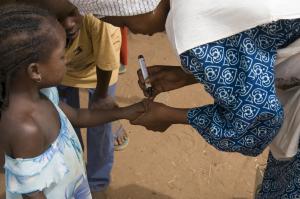Niger reports new polio outbreak
Brazzaville, – Niger has reported a new polio outbreak that has affected two children in Niamey and Tillaberi region, the World Health Organization (WHO) said today.
Last December, the West African country along with Kenya and Mozambique reported ending polio outbreaks that had lasted 24 months. However, this new circulating vaccine-derived poliovirus transmission, that paralysed a child on February 15, is not linked to the outbreak that was closed last year.
“Niger stopped the previous polio outbreaks by mounting high quality mass vaccination campaigns in 2019. Unfortunately, that will not be possible now as we have suspended the polio mass vaccination campaigns due to the novel coronavirus (COVID-19) pandemic responses that requires global standards for social distancing and hand washing hygiene practices,” said Dr Pascal Mkanda, Coordinator of Polio Eradication Programme in the African Region.
“The poliovirus will inevitably continue to circulate and may paralyse more children as no high-quality immunization campaigns can be conducted in a timely manner,” said Dr Mkanda.
Niger now joins the list of countries experiencing vaccine-derived poliovirus outbreaks in Africa, ramping up the total to 15 countries. The other countries are: Angola, Benin, Burkina Faso, Cameroon, Central African Republic, Chad, Côte d'Ivoire, Democratic Republic of the Congo, Ethiopia, Ghana, Mali, Nigeria, Togo and Zambia.
In these countries, weak routine vaccination coverage, vaccine refusal, difficult access to some locations and low-quality vaccination campaigns have made immunization of all children difficult.
Vaccine-derived polioviruses are rare, but these viruses affect unimmunized and under-immunized populations living in areas with inadequate sanitation and low levels of polio immunization. When children are immunized with the oral polio vaccine, the attenuated vaccine virus replicates in their intestines for a short time to build up the needed immunity and is then excreted in the faeces into the environment where it can mutate. If polio immunization coverage remains low in a community and sanitation remains inadequate, the mutated viruses will be transmitted to susceptible populations, leading to emergence of vaccine-derived polioviruses.
As the COVID-19 pandemic continues to spread in the African Region, most countries have enforced travel restrictions and suspended health activities that do not comply with physical distancing guidelines following WHO’s recommendations. Mass immunization activities across the region have been postponed until further notice. However, the polio eradication programme in the African Region strives to sustain essential disease surveillance functions as well as planning for a rapid scale up in immunization activities once the COVID-19 situation permits.
“Following the outbreak in Niger, we are currently investigating to understand what happened and carrying out a risk assessment to know the magnitude of the problem. We are also working with WHO country colleagues, local authorities and partners to prepare a team to be deployed once COVID-19 is over,” said Dr Modjirom Ndoutabe, Coordinator of the WHO-led polio outbreaks Rapid Response Team for the African Region.
Niger’s last wild polio case was in 2012 and the Africa Regional Certification Commission (ARCC), the independent commission designated to certify the eradication of wild poliovirus in the African Region accepted the national documentation of wild poliovirus-free status in 2016.
No wild poliovirus has been detected anywhere in Africa since 2016. This stands in stark contrast to 1996, a year when wild poliovirus paralysed more than 75,000 children across every country on the continent. The ARCC was expected to certify the region free of wild poliovirus in June 2020, however, given the COVID-19 travel restriction this timeline is due to change.
Polio Communications Officer
Email: habdallah [at] who.int
Tel: +201123000665 (WhatsApp)
Communication officer
Email : mokhtarmohameda [at] who.int
GPN : 32 462
Mobile +227 92 19 95 45
